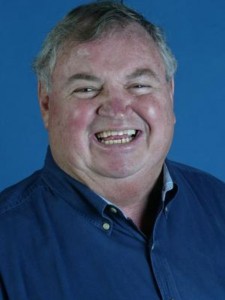
By Raul Hernandez
[email protected]
The Irishman died last weekend.
He was 82 years. He had four decades of newspaper reporting under his belt, and he was a good friend.
Ken Flynn was also a deacon in the Catholic Church, and it wasn’t unusual that after he left the newsroom, he would go do the rosary service at a funeral. He did dozens and dozens of baptisms, funerals and marriages.
I would tease him, and say, “Wow, what a racket you have going.”
He would burst out laughing. But I knew Kenny loved people, loved his church and his big heart only rivaled his sense of humor.
There were so many memories I shared with “The Deacon” and almost all were spawned when we worked together at the now-closed El Paso Herald-Post newsroom.
But the one memory that sticks out is when he sat at a barstool next to me at La Kumbala Bar on Alameda Street in El Paso.
Ken and I went to the Mex-Tex bar the weekend after five execution-style, murders happened there.
On Friday night, we were off the clock but wondering who would show up at the very large dance nightclub after these five employees were taken to a back office after closing hours and each one shot in the back of the head.
Usually, on Fridays, the place was packed with blue-collar workers but there were less than a dozen people including waitresses and bartenders when we arrived.
Ken and I soon had a buzz going. I sipped Corona beers. He drank tequila and mix drinks. There was a waitress sitting at a corner bar stool. Business was so slow.
I jokingly said, “Go dance with her, Kenny, and pump her for some information about the owners.” He said, “Think I should?” I said, “Hell, yeah.”
He laughed. His laughter was always suspended somewhere between a chuckle and muffled laughter.
I didn’t think he would dance with anyone at the bar, much less the waitress. But I knew he loved to dance. He was Old School rock ‘n roll.
I ordered another round. He got up, and I thought he was going to the restroom, but next thing I know, he and the waitress were dancing to a Mexican Cumbia. They were the only two on the dance floor.
We ended up leaving there after a few drinks and after tag-teaming the bartenders and the waitress about what they knew about the murders and the owners. We didn’t get much, very little. But we had a good time.
When we were leaving, walking out into the parking lot, I had a nice buzz going as Mexican music blared out the bar’s doors and spilled into the nearly empty parking lot.
As he walked away to get into his car, he said, “I got a baptism tomorrow, Ruly. I hope I don’t screw it up.”
I gave him a thumbs up and an alcohol-induced smile.
“You can do baptisms and funerals in your sleep. You won’t f**k it up, Kenny.”
He laughed.
In 1997, the year the Herald-Post closed was the best year of my thirty-plus years as a journalist. I worked with friends like Ken who were more like family. We even went to lunch in groups like nuns and enjoyed each other’s company, swapping “war stories,” teasing each other and had occasional bitch sessions.
Sometimes, we’d hit the downtown watering holes.
We loved to trounce the competition. It was fun going to work because I was going to be with my family. I didn’t mind the long hours, going to work before the sun came up and coming home long after it had set.
My Herald-Post family knew that our days were numbered, the closure rumors and the circulation bottomline were evident that time was running out. We would soon close our doors. So we worked harder at beating the bushes while making up the rules along the way and rattling management cages.
Assistant City Editor Kenny proudly grinned and summed it up best: “The inmates are running the asylum.”
I loved listening to Kenny about his early days in journalism.
He once interviewed Martin Luther King Jr. at the civil rights leader’s house in 1957 as a cub reporter assigned with the UPI bureau in Montgomery Alabama. He covered the bus boycotts and the church bombings in Montgomery.
Kenny was fluent in Spanish, and was once the El Paso president of the League of United Latin American Citizens, the nation’s largest Hispanic civil rights group.
Two years before he died, Kenny said he could no longer take care of his ailing wife, Margarita, whom he had met in Chihuahua. He had to put her in a nursing home and confided that it was hard for him to do so because she kept begging him to take her home.
With his voice cracking a bit with emotion, he said “I can’t take care of her anymore, Ruly.” But he said it hurts, especially when he was leaving the nursing home. He visited his bride every day.
When Margarita died, Kenny seemed to have lost his reason for living. I told him to write a book about all those years as a newspaper man, go out for a walk and get out of the house.
I tried to encourage him, telling him that there are many people who would love to read about those early newsroom days.
When I found out that he had died, I was sad for a while and later smiled and then, I laughed when I remember that dance that night at the Kumbala.
Rest in Peace, my friend.

